Attractions · Caribbean · Cuba · Going Out · Regions
Top 10 places to see history in Cuba
Dont spend all your time in Cuba lounging on the beach. Sign up to tour the locations where Cubas history changed forever. Monuments of revolutions past still cast a long shadow on this island. You can see evidence of Spanish colonial rule in almost every major city, as well as fading propaganda posters promoting Castros government.
Here are some of the most interesting destinations they offer dramatic history in the midst of gorgeous scenery.
1. Bay of Pigs
In 1961, the CIA attempted to topple Castros government, and chose a beach called the Bay of Pigs as the place where they would invade from the sea. You can visit the Girón Museum to learn more about the official Cuban perspective on the invasion. The beach (known locally as Playa Girón) and is located inside the border of the Ciénaga de Zapata National Park. Visit the nearby lagoons for a chance to glimpse some manatees. There are several worthwhile dive sites, including Punta Perdiz and the sinkhole at Cueva de los Peces (or Cave of the Fishes in English).
 2. Castillo de Real Fuerza
The Spanish began building Castillo de la Real Fuerza in 1558, making this fortress not just the oldest fortress in Cuba, but also the oldest colonial building in the Americas. On top of one of the watchtowers youll see an iconic bronze statue called La Giraldilla, which also features on the label of Havana Club rum.
2. Castillo de Real Fuerza
The Spanish began building Castillo de la Real Fuerza in 1558, making this fortress not just the oldest fortress in Cuba, but also the oldest colonial building in the Americas. On top of one of the watchtowers youll see an iconic bronze statue called La Giraldilla, which also features on the label of Havana Club rum.
 3. Palacio Presidencial (Museum of the Revolution)
Built in the early 20th-century, this grand building has a hall that takes its architectural cues from Versailles. As the Presidents Palace, this palace last served as a home for Fulgencio Battista, Castros nemesis. Outside the palace you can see a memorial to the Granma, the ship that Castro used to initiate his revolution. Inside the museum youll find exhibits that cover history from the pre-Columbian era to the present, with a distinctly pro-Castro spin.
3. Palacio Presidencial (Museum of the Revolution)
Built in the early 20th-century, this grand building has a hall that takes its architectural cues from Versailles. As the Presidents Palace, this palace last served as a home for Fulgencio Battista, Castros nemesis. Outside the palace you can see a memorial to the Granma, the ship that Castro used to initiate his revolution. Inside the museum youll find exhibits that cover history from the pre-Columbian era to the present, with a distinctly pro-Castro spin.
 4. Che Guevara Cultural Memorial and Museum
The Che Guevara Memorial is in Santa Clara, which is the city where the last battle of Castros revolution took place. Che Guevara was the general leading the troops that finally defeated Battistas army. Visit the museum to see exhibits about Guevaras life. This memorial also includes a mausoleum where the Guevaras remains have been interred.
4. Che Guevara Cultural Memorial and Museum
The Che Guevara Memorial is in Santa Clara, which is the city where the last battle of Castros revolution took place. Che Guevara was the general leading the troops that finally defeated Battistas army. Visit the museum to see exhibits about Guevaras life. This memorial also includes a mausoleum where the Guevaras remains have been interred.
 5. Hemingway Musuem (Finca Vigía)
Hemingway lived at this colonial-style home from 1940 to 1960. You can admire the interiors from the outside it has been maintained to look as it did when Hemingway lived there. Youll see the heads of animals that Hemingway hunted mounted on the walls, and the books and magazines that he loved lining the bookcases.
5. Hemingway Musuem (Finca Vigía)
Hemingway lived at this colonial-style home from 1940 to 1960. You can admire the interiors from the outside it has been maintained to look as it did when Hemingway lived there. Youll see the heads of animals that Hemingway hunted mounted on the walls, and the books and magazines that he loved lining the bookcases.
 6. Trinidad
Spanish conquistador Diego de Velázquez founded Trinidad in 1514. It is one of Cubas most idyllic cities, with pastel-colored buildings that have been restored to their colonial glory. Cobblestone streets and the view from the History Museum make this a lovely, nostalgic spot.
6. Trinidad
Spanish conquistador Diego de Velázquez founded Trinidad in 1514. It is one of Cubas most idyllic cities, with pastel-colored buildings that have been restored to their colonial glory. Cobblestone streets and the view from the History Museum make this a lovely, nostalgic spot.
 7. Paradise Cave Archaeological Museum in Baracoa
You can see remnants of the oldest culture in Cuba at the Paradise Cave Archaeological Museum, in the town of Baracoa. Before the Spanish came, Cuba was home to an indigenous people called the Taíno. Inside the cave you can see skeletal remains, displayed in the midst of stalactites and stalagmites. There are also exhibits of Taíno sculptures, jewelry, and ceramics.
7. Paradise Cave Archaeological Museum in Baracoa
You can see remnants of the oldest culture in Cuba at the Paradise Cave Archaeological Museum, in the town of Baracoa. Before the Spanish came, Cuba was home to an indigenous people called the Taíno. Inside the cave you can see skeletal remains, displayed in the midst of stalactites and stalagmites. There are also exhibits of Taíno sculptures, jewelry, and ceramics.
 8. La Comandancia de la Plata
Venture inside Pico Turquino National Park home of Cubas tallest mountain to see La Comandancia de la Plata, a cluster of cabins that served as Castros hideout, beginning in 1958. The preserved buildings include a hospital, as well as some of the huts where Castro, Che Guevara, and the rest of the rebel forces hid from Battista.
8. La Comandancia de la Plata
Venture inside Pico Turquino National Park home of Cubas tallest mountain to see La Comandancia de la Plata, a cluster of cabins that served as Castros hideout, beginning in 1958. The preserved buildings include a hospital, as well as some of the huts where Castro, Che Guevara, and the rest of the rebel forces hid from Battista.
 9. Moncada Military Barracks
On July 26, 1953, Cubas rebel forces laid siege to the The Moncada Military Barracks, and began the slow dismantling of Battistas government. Since taking power, Castro has declared July 26 an important federal holiday. The Moncada Barracks now serve as a school. While youre here you can visit the Museo Histórico 26 de Julio, and see artifacts related to the attack.
9. Moncada Military Barracks
On July 26, 1953, Cubas rebel forces laid siege to the The Moncada Military Barracks, and began the slow dismantling of Battistas government. Since taking power, Castro has declared July 26 an important federal holiday. The Moncada Barracks now serve as a school. While youre here you can visit the Museo Histórico 26 de Julio, and see artifacts related to the attack.
 10. El Morro Historic Park
El Morro Historic Park is located just outside of the city of Santiago. From the 1800s to the 1960s this building served as a prison. It was originally build in the 16th century, and still has some of the cannons from the days when it served as a fort. Climb the stairs to the Morro Lighthouse for a lovely view of the Sierra Maestra.
10. El Morro Historic Park
El Morro Historic Park is located just outside of the city of Santiago. From the 1800s to the 1960s this building served as a prison. It was originally build in the 16th century, and still has some of the cannons from the days when it served as a fort. Climb the stairs to the Morro Lighthouse for a lovely view of the Sierra Maestra.
 Zach Smith is CEO of Anywhere.
If you would like to be a guest blogger on A Luxury Travel Blog in order to raise your profile, please contact us.
Zach Smith is CEO of Anywhere.
If you would like to be a guest blogger on A Luxury Travel Blog in order to raise your profile, please contact us.
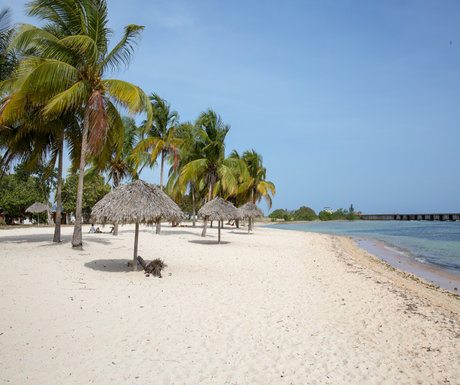 2. Castillo de Real Fuerza
The Spanish began building Castillo de la Real Fuerza in 1558, making this fortress not just the oldest fortress in Cuba, but also the oldest colonial building in the Americas. On top of one of the watchtowers youll see an iconic bronze statue called La Giraldilla, which also features on the label of Havana Club rum.
2. Castillo de Real Fuerza
The Spanish began building Castillo de la Real Fuerza in 1558, making this fortress not just the oldest fortress in Cuba, but also the oldest colonial building in the Americas. On top of one of the watchtowers youll see an iconic bronze statue called La Giraldilla, which also features on the label of Havana Club rum.
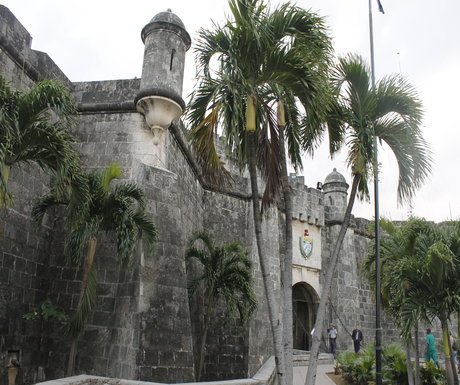 3. Palacio Presidencial (Museum of the Revolution)
Built in the early 20th-century, this grand building has a hall that takes its architectural cues from Versailles. As the Presidents Palace, this palace last served as a home for Fulgencio Battista, Castros nemesis. Outside the palace you can see a memorial to the Granma, the ship that Castro used to initiate his revolution. Inside the museum youll find exhibits that cover history from the pre-Columbian era to the present, with a distinctly pro-Castro spin.
3. Palacio Presidencial (Museum of the Revolution)
Built in the early 20th-century, this grand building has a hall that takes its architectural cues from Versailles. As the Presidents Palace, this palace last served as a home for Fulgencio Battista, Castros nemesis. Outside the palace you can see a memorial to the Granma, the ship that Castro used to initiate his revolution. Inside the museum youll find exhibits that cover history from the pre-Columbian era to the present, with a distinctly pro-Castro spin.
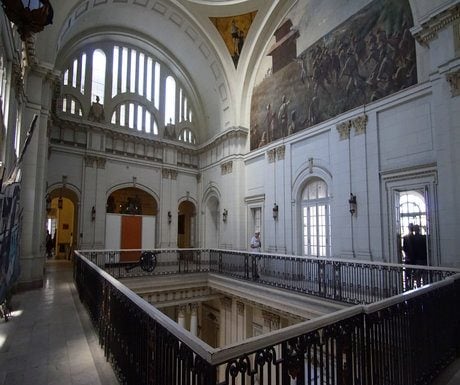 4. Che Guevara Cultural Memorial and Museum
The Che Guevara Memorial is in Santa Clara, which is the city where the last battle of Castros revolution took place. Che Guevara was the general leading the troops that finally defeated Battistas army. Visit the museum to see exhibits about Guevaras life. This memorial also includes a mausoleum where the Guevaras remains have been interred.
4. Che Guevara Cultural Memorial and Museum
The Che Guevara Memorial is in Santa Clara, which is the city where the last battle of Castros revolution took place. Che Guevara was the general leading the troops that finally defeated Battistas army. Visit the museum to see exhibits about Guevaras life. This memorial also includes a mausoleum where the Guevaras remains have been interred.
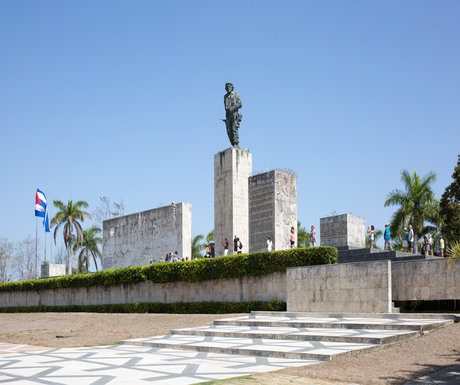 5. Hemingway Musuem (Finca Vigía)
Hemingway lived at this colonial-style home from 1940 to 1960. You can admire the interiors from the outside it has been maintained to look as it did when Hemingway lived there. Youll see the heads of animals that Hemingway hunted mounted on the walls, and the books and magazines that he loved lining the bookcases.
5. Hemingway Musuem (Finca Vigía)
Hemingway lived at this colonial-style home from 1940 to 1960. You can admire the interiors from the outside it has been maintained to look as it did when Hemingway lived there. Youll see the heads of animals that Hemingway hunted mounted on the walls, and the books and magazines that he loved lining the bookcases.
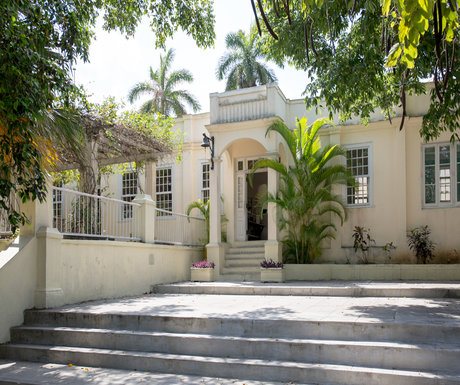 6. Trinidad
Spanish conquistador Diego de Velázquez founded Trinidad in 1514. It is one of Cubas most idyllic cities, with pastel-colored buildings that have been restored to their colonial glory. Cobblestone streets and the view from the History Museum make this a lovely, nostalgic spot.
6. Trinidad
Spanish conquistador Diego de Velázquez founded Trinidad in 1514. It is one of Cubas most idyllic cities, with pastel-colored buildings that have been restored to their colonial glory. Cobblestone streets and the view from the History Museum make this a lovely, nostalgic spot.
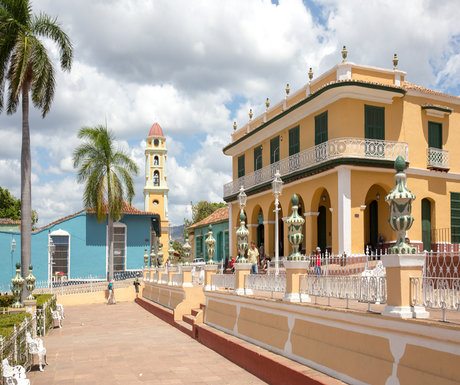 7. Paradise Cave Archaeological Museum in Baracoa
You can see remnants of the oldest culture in Cuba at the Paradise Cave Archaeological Museum, in the town of Baracoa. Before the Spanish came, Cuba was home to an indigenous people called the Taíno. Inside the cave you can see skeletal remains, displayed in the midst of stalactites and stalagmites. There are also exhibits of Taíno sculptures, jewelry, and ceramics.
7. Paradise Cave Archaeological Museum in Baracoa
You can see remnants of the oldest culture in Cuba at the Paradise Cave Archaeological Museum, in the town of Baracoa. Before the Spanish came, Cuba was home to an indigenous people called the Taíno. Inside the cave you can see skeletal remains, displayed in the midst of stalactites and stalagmites. There are also exhibits of Taíno sculptures, jewelry, and ceramics.
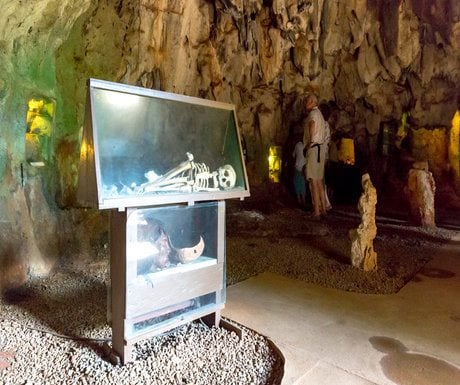 8. La Comandancia de la Plata
Venture inside Pico Turquino National Park home of Cubas tallest mountain to see La Comandancia de la Plata, a cluster of cabins that served as Castros hideout, beginning in 1958. The preserved buildings include a hospital, as well as some of the huts where Castro, Che Guevara, and the rest of the rebel forces hid from Battista.
8. La Comandancia de la Plata
Venture inside Pico Turquino National Park home of Cubas tallest mountain to see La Comandancia de la Plata, a cluster of cabins that served as Castros hideout, beginning in 1958. The preserved buildings include a hospital, as well as some of the huts where Castro, Che Guevara, and the rest of the rebel forces hid from Battista.
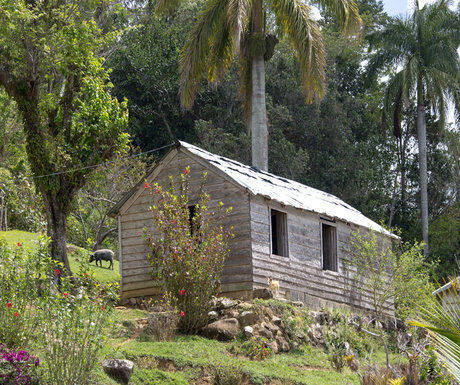 9. Moncada Military Barracks
On July 26, 1953, Cubas rebel forces laid siege to the The Moncada Military Barracks, and began the slow dismantling of Battistas government. Since taking power, Castro has declared July 26 an important federal holiday. The Moncada Barracks now serve as a school. While youre here you can visit the Museo Histórico 26 de Julio, and see artifacts related to the attack.
9. Moncada Military Barracks
On July 26, 1953, Cubas rebel forces laid siege to the The Moncada Military Barracks, and began the slow dismantling of Battistas government. Since taking power, Castro has declared July 26 an important federal holiday. The Moncada Barracks now serve as a school. While youre here you can visit the Museo Histórico 26 de Julio, and see artifacts related to the attack.
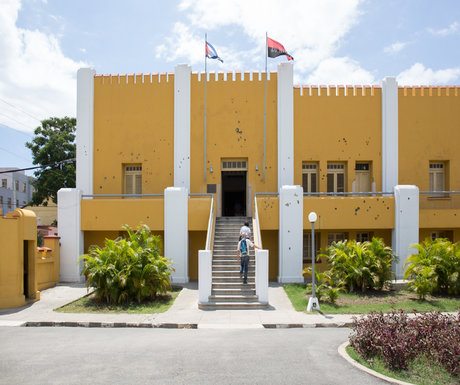 10. El Morro Historic Park
El Morro Historic Park is located just outside of the city of Santiago. From the 1800s to the 1960s this building served as a prison. It was originally build in the 16th century, and still has some of the cannons from the days when it served as a fort. Climb the stairs to the Morro Lighthouse for a lovely view of the Sierra Maestra.
10. El Morro Historic Park
El Morro Historic Park is located just outside of the city of Santiago. From the 1800s to the 1960s this building served as a prison. It was originally build in the 16th century, and still has some of the cannons from the days when it served as a fort. Climb the stairs to the Morro Lighthouse for a lovely view of the Sierra Maestra.
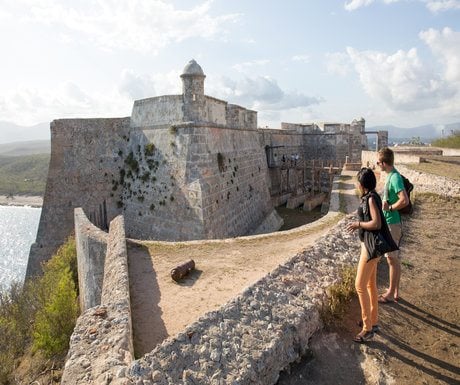 Zach Smith is CEO of Anywhere.
If you would like to be a guest blogger on A Luxury Travel Blog in order to raise your profile, please contact us.
Zach Smith is CEO of Anywhere.
If you would like to be a guest blogger on A Luxury Travel Blog in order to raise your profile, please contact us.Did you enjoy this article?
Receive similar content direct to your inbox.


The history of Cuba is fascinating and it is amazing that the Country has survived as well as it has. See it now before it becomes to commercialised
I didn’t know Cuba had so much history – such a beautiful country. I couldnt visit the Paradise Cave Archaeological Museum – too creepy with the skeletons!
I would love to visit the Paradise Cave Museum. I don’t know anything about Cuba, really, so would like to know more about the Taino.
This countryis full of colour,history and the food is to die for,plus the people are so friendly and welcoming x
Hi, i´m Cuba and i live in Habana City and sorry but i have tu tell you that the second photo isn´t the Castillo de la Real Fuerza, that´s a Police station, you can see the coat of arms above the entrance, to the right of the station the next thing your will see it is the Seminary of San Carlos, a long and colonial building with archaeological excavations in front of it, at the end of this building you will see the backyard of the the Castillo de la Real Fuerza, if you want to reach its entry you must round the Castle always keeping the sea on your left… my best regards, Thank you, and welcome to Cuba!!!